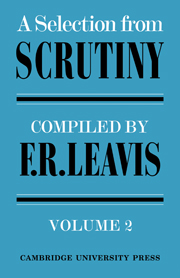9 - THE HISTORY OF CRITICAL JOURNALISM
The Great Reviews
Published online by Cambridge University Press: 04 August 2010
Summary
In Scrutiny for June 1935 [see p. 272 below] Mr Denys Thompson drew attention to the fact that throughout the greater part of the nineteenth century this country possessed a serious, intelligent and responsible journalism, providing a focus for current movements of thought and opinion, a means of livelihood and a field of action for the middlemen of letters, and an authoritative expression of critical standards. The subject is obviously one for extended study, but a very limited inquiry is sufficient to bring home the fact that the present state of periodical criticism is exceptional, and that the easy excuse that things were always the same, so often used to defend a complacent acquiescence in the contemporary critical anarchy, is simply not true. I propose to concentrate here on the period which saw the foundation of the Edinburgh Review, the Quarterly Review, and Blackwood's Magazine, and their rapid assumption of critical authority, and within this period to consider mainly specific criticism of literature. These notes are intended as illustrations of the kind and quality of the critical work of the Reviewers: their preoccupations and preconceptions in matters of taste, their methods, and their authority and influence.
In the first place one cannot insist too strongly on the fact that the Reviews had a larger sale in actual numbers, without working out the proportion to the population, than most modern periodicals with anything approaching the same pretensions to intelligence and seriousness. The Edinburgh and the Quarterly were selling nearly 14,000 copies each at their peak period, about 1818 to 1819, and Blackwood's soon reached a similar sale.
- Type
- Chapter
- Information
- A Selection from Scrutiny , pp. 241 - 279Publisher: Cambridge University PressPrint publication year: 1968



